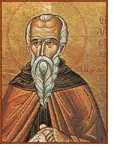
“There are three ways through which thoughts arise in you: through the senses, through the memory, and through the body’s temperament. Of these the most irksome are those that come through the memory.”
– St. Thalassios the Libyan

“There are three ways through which thoughts arise in you: through the senses, through the memory, and through the body’s temperament. Of these the most irksome are those that come through the memory.”
– St. Thalassios the Libyan